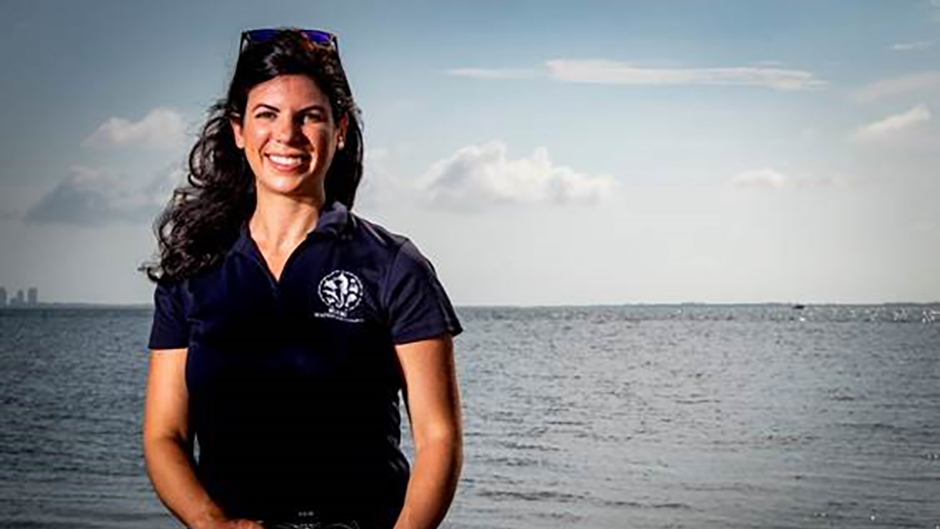As a girl growing up in San Diego, Rachel Silverstein was fascinated by marine environments and the creatures that inhabit them.
That interest sparked what eventually became her life’s calling. Now, as executive director and waterkeeper of the non-profit organization Miami Waterkeeper, whose mission is to ensure swimmable, drinkable, and fishable water for all, her work is animated by a passion for the environment and grounded in the science of conservation.
At 14, Silverstein earned her SCUBA certification and, as she recalled, “there was no going back for me”—her future path as a scientist and environmentalist beckoned. From California, she went to New York, where she earned a bachelor’s degree in environmental biology from Columbia University.
As an undergraduate, Silverstein worked with Andrew Baker, Ph.D. ’99, now professor of marine biology and ecology at the Rosenstiel School of Marine and Atmospheric Science. At that time, Baker worked at the Wildlife Conservation Society and was an adjunct faculty member at Columbia. “He would bring corals back to the lab [in New York], where we studied their genetics and resistance to climate change,” Silverstein said.
Silverstein followed Baker to the Rosenstiel School, where she worked in his lab, studied the effects of climate change on corals, and earned her doctorate in 2012. She spent a year in Washington, D.C., as a Sea Grant Knauss Fellow, part of a marine policy fellowship program of the National Oceanic and Atmospheric Administration (NOAA). She worked with the U.S. Senate commerce subcommittee that oversees NOAA and is responsible for matters affecting oceans, coasts, and atmosphere.
Silverstein’s fellowship experience served to crystallize her long-term ambition. “The issues I worked on [in Washington] made me want to come back to Miami and work to protect the ecosystems here,” she said.
In 2014 she was appointed Miami Waterkeeper, an independent non-profit that is part of the global Waterkeeper Alliance. She immediately found herself confronting a daunting challenge right on Miami’s doorstep. Dredging by the U.S. Army Corps of Engineers to expand navigation channels at the Port of Miami had buried more than 250 acres of coral reef near the port in sediment between 2013 and 2015.
Miami Waterkeeper, along with other local environmental groups, filed a lawsuit under the Endangered Species Act to obtain protections for the elkhorn and staghorn corals that were under severe threat from the dredging. After protracted litigation, the Army Corps and Miami-Dade County reached a settlement that provided for the restoration of 10,000 staghorn corals led by Diego Lirman, Ph.D. ’97, associate professor at the Rosenstiel School, and funding for the Miami-Dade County Mooring Buoy program to prevent anchor damage to reefs.
The settlement was a first step, and Silverstein and her colleagues are still fighting to get proper mitigation for the entire area damaged by the dredging. A 2019 paper co-authored by Baker, Rosenstiel School alumnus Ross Cunning, Ph.D. ’13, Brian Barnes, and Silverstein estimated that the dredging killed more than half a million corals and the impacts may have spread across more than 15 miles of Florida’s reef tract.
For Silverstein, the experience provided a clear example of how science can both tell “a devastating story of loss” and inform environmental protection efforts. “[It starts] with a foundation of science, making sure the science is solid and data gaps are filled for the benefits of managers who are making decisions about how to protect the environment,” she said.
Along with sound science, two other key elements to protecting the South Florida watershed are citizen engagement and community action. Both are major areas of focus for Silverstein and her team at Miami Waterkeeper.
One of their signature community programs is 1,000 Eyes on the Water, which trains members of the public to identify, document, and report pollution issues affecting South Florida beaches and waterways. “We train people on what to look for and report so that notices of violation can be issued to get the pollution stopped,” Silverstein said. Miami Waterkeeper also has water monitoring sites around Miami-Dade County, including at the Rosenstiel School, to keep watch on bacteria levels in Biscayne Bay.
Miami Waterkeeper’s media, legal, and legislative advocacy focuses on the major threats to South Florida’s watershed, including fertilizer overuse, stormwater runoff, sewage leaks, and septic tanks, all of which contribute to nutrient pollution that endangers fish populations, triggers algae blooms, and/or closes beaches.
Silverstein cites fertilizer runoff as an example of the way Miami Waterkeeper engages with county and municipal authorities to drive solutions. “In an effort to get new regulations to limit fertilizer pollution,” she noted. “We worked city by city and have helped pass eight municipal fertilizer ordinances,” until it was finally passed in Miami-Dade County.
“As of 2021, Miami-Dade County has one of the strongest residential fertilizer ordinances in Florida,” Silverstein said. “No fertilizer use [is permitted] between May 15 and October 15, and never within 20 feet of storm drains or waterways. We are now working on a statewide ordinance—we want Miami-Dade to become a model for the state, tailored to the different regions.”
Above all, there is the existential threat posed by sea-level rise. South Florida’s aging sewer infrastructure and 120,000 residential and commercial septic systems are vulnerable to compromise or failure due to rising groundwater and seawater intrusion. Silverstein and Miami Waterkeeper are on the front lines advocating for sustainable solutions, including the removal of flood-vulnerable septic tanks and increased funding to strengthen the county’s sewers.
For Silverstein, being a waterkeeper is a multidimensional, multidisciplinary job. At its core she serves as a spokesperson for the water. “Our water is what makes Miami, Miami. We have a lot to lose if we don’t get water pollution under control. My job is to represent our environment in our community.”

